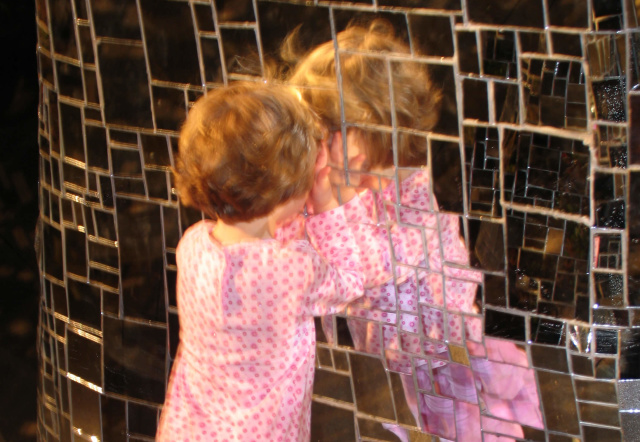“You’ll never be skinny. That doesn’t mean I don’t think you’re beautiful. I do. But you are not ever going
to be ‘skinny.'”
Those are my mother’s words.
Although meant with no harm, they still haunt me today. In fact, ask her, and she’ll repeat the same sentiment even now. There’s no mincing words in her household. Yes, there was a compliment somewhere in that statement, but the thought that I would never been thin — during an era where a practically emaciated figure was the hottest style — cut me deep.
Now, 20 years later and a parent myself, I swore I would never say something like that if I had a little girl. But I never thought I would have similar conversations while raising a boy.
My son is 5 years old, and to be blunt, he worries about being fat, in his own words. So much so, that he wants to stop eating once his stomach “pokes out.” And when I ask him what he thinks of himself, he says, “I just want to be skinny.”
Mirror mirror, did he see this in me?
As my son grows, I am learning that having a child is sometimes like having a mirror of my worst traits, forcing me to look at those things about myself that I don’t really want to see. My own body-image issues are now right in front of me — reflected in my child.
My child is kind, loving and truly has a way of making people feel beautiful and appreciated. It is one my favorite things about him. Why doesn’t he see the same beauty in himself? When disparaging comments about his own image are repeated — and they have been — I have to examine where he is getting his ideas of beauty and how he is forming his self image.
In my family, we work out regularly. I LOVE to exercise. I’m a stressed-out, tense, overachiever who needs to wear myself out to stay sane. But how much time do I spend talking about my looks instead of my health?
Apparently, too much. So the question has now become, how can I teach my son to take care of himself without taking it too far? Plus, how do I help him see a positive image in me, so he can see it in himself?
It’s time to alter the mirror
In an article from Parents.com, Aviva Braun says:
Mothers […] are the first and most significant female models in their developing daughters’ lives. They are faced with the difficult challenge of modeling positive feelings toward food, eating, and body image. […] If a child witnesses her mother expressing disgust at her image in the mirror, the child may begin to mimic that behavior.
Sounds simple and obvious, but for me, it’s just not that simple.
It has become more difficult for preteens as well. In this selfie-driven world, the line between confidence and narcissism is blurry. In a CNN special report, a 13-year-old girl admits to taking 100 to 200 selfies at a time just to get the “right” one.
And that’s what my son has to grow up with.
This is the new digital world; there’s a record of everything, and every single picture seems to last forever. Parents do the same thing as their teenage counterparts on Facebook, Instagram and Twitter, and the quest for perfection even extends into school pictures, with companies now offering retouching services. For the bargain price of $5 to $8, you can purchase basic or premium retouching of your child’s photo “to focus on their smile.”
This makes me want to throw up.
Seven ways to improve kids’ self images
I understand how teens feel stress and pressure over their image, but not my 5-year-old. It’s my job to protect him, guide him, defend his innocence and lead him to understand that beauty is only skin deep, everyone is different — and different sizes — and your self worth should be obtained from who you are inside.
Because sadly, he’s not too young to be subject to his own struggles. According to the Academy of Nutrition and Dietetics, preschool age children can even experience body-image disorders, inspiring their EatRight program. The organization also describes kids with a negative body image as more anxious, isolated and at greater risk for excessive weight gain or eating disorders.
So, here’s what I’m going to do: I will work on my own issues, and, in return, hopefully he and I both will learn to like what we see. I will also try to be more aware of ways to encourage him. I’m going to start with the following simple ways to foster a positive body image. These compiled ideas are not rocket science, but the difficulty comes in commitment to a more progressive outlook.
- Words have power and the ability to leave scars. Avoid words like fat, diet, skinny or any other descriptions attached to a negative connotation. Instead, describe lifestyle choices from a healthy or unhealthy perspective to encourage good habits rather than saying things can make you fat or skinny.
- Stop making critical comments about yourself — size or appearance. Little ears are always hearing, and observant eyes always watching.
- Explain to your child how they are growing, and that his or her body will change. Let them know that they need good food to fuel their growth.
- Encourage activity, but not for weight loss. The Academy of Nutrition and Dietetics says, “Children don’t need to work out; they need to play with family and friends.” Health and fitness will follow.
- Teach them to be discerning when it comes to media. Let them know that images are altered for perfection, and help them understand that there’s no single body type that’s right for everyone.
- Focus on the inside. Let them know all the things you love about them that have nothing to do with their appearance.
- Teach emotional intelligence. We all love happy kids, but listen to their concerns. It’s alright to be sad or frustrated. Allow them to express those emotions.
Let’s stop blaming media, schools, peers and all of the easy targets. We can drown out the negative with our own positive voices. Reflect what you want most for your child. Yoko Ono said, “Smile in the mirror. Do that every morning and you’ll start to see a big difference in your life.”
Mirror mirror, here goes nothing.






















